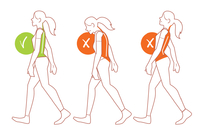Merdeka.com – Breathing is one of the most important and vital actions that every living being must take. Consciously or not, our breath also changes in patterns and rhythms at different times, and under different emotional states. For example, when you sigh out of despair, gasp for exhaustion, or hold your breath when you are afraid.
Breathing can happen automatically without our need to think about it, and we can also change it consciously, at will. Due to the unique relationship between our thoughts and bodily processes, our breathing patterns can play a role in determining the stressful conditions experienced.
One type of breathing is abdominal breathing. When we do abdominal breathing, the diaphragm tightens, flattens out and moves downward, drawing air into the lungs. As the diaphragm moves downward, it pushes the contents of the stomach downward, forcing the abdominal wall out. When we exhale, the diaphragm relaxes, the air leaves the lungs and the abdominal wall flattens.
These benefits of belly breathing have an impact on the whole body. Belly breathing is also the basis of almost any meditation or relaxation technique. Here are some of the benefits of abdominal breathing that can be obtained:
Helps the Respiratory System Work Efficiently

© 2013 Merdeka.com/Shutterstock/Stephane Bidouze
Reporting from the Do You page, the first benefit of abdominal breathing is to help the respiratory system work efficiently. As we age, many of us inadvertently train ourselves to use the most efficient method of breathing, which is diaphragmatic breathing.
With poor breathing habits, gas exchange becomes inefficient. This means that our cells are not getting the nutrients they need. When trillions of cells don’t get enough nutrition, we can experience sluggish body and brain fog in the short term, as well as chronic health problems in the long term. Retraining yourself to breathe with your stomach or diaphragm can result in natural vitality and well-being.
Stimulates a Relaxation Response
The second benefit of abdominal breathing is to stimulate a relaxation response. The “relaxation response” refers to the activation of the parasympathetic nervous system. It also shuts down an overactive sympathetic nervous system (such as the “stress response”).
Deep breathing is our only access to this autonomic nervous system, which automatically makes our heart beat and makes digestion more efficient.
By developing the capacity to choose the relaxation response over the stress response, we can calm anxiety and lower the risk of stress-related conditions such as heart disease, indigestion, sleep disorders, depression, and more.
In particular, you can initiate a relaxation response by practicing deep diaphragmatic breathing with long exhales.
Relieves Pain
The third benefit of abdominal breathing is to help relieve pain. Some people report that they experience increased pain when they feel stressed. Chronic pain is closely related to an increased stress response.
By using breathing techniques, such as diaphragmatic breathing, we can help relieve pain in the short term and reduce the likelihood of flares in the long term.

barbend.com
Stretching and Tightening Core Muscles
The fourth benefit of abdominal breathing is to stretch and tone your core muscles. The core muscles include the abdominal muscles, erector back muscles (muscles that keep us upright), diaphragm, and pelvic floor. When we do abdominal breathing, the natural movements of the body help maintain healthy muscles in that area.
Improve Posture

© 2017 cdn.gogirlmagz.com
The last benefit of abdominal breathing is to improve posture. In order to properly perform diaphragmatic breathing, you must sit in an upright position. This allows all organ systems to work more efficiently.
You digest food better, your heart pumps more efficiently, your nerves and blood vessels are less likely to get pinched, and you can release more hormones that make you feel more confident. With all the body systems working better, you will feel more confident and focused.
[ank]
 Illustration of breathing. © 2012 Shutterstock / Robert Kneschke
Illustration of breathing. © 2012 Shutterstock / Robert Kneschke

